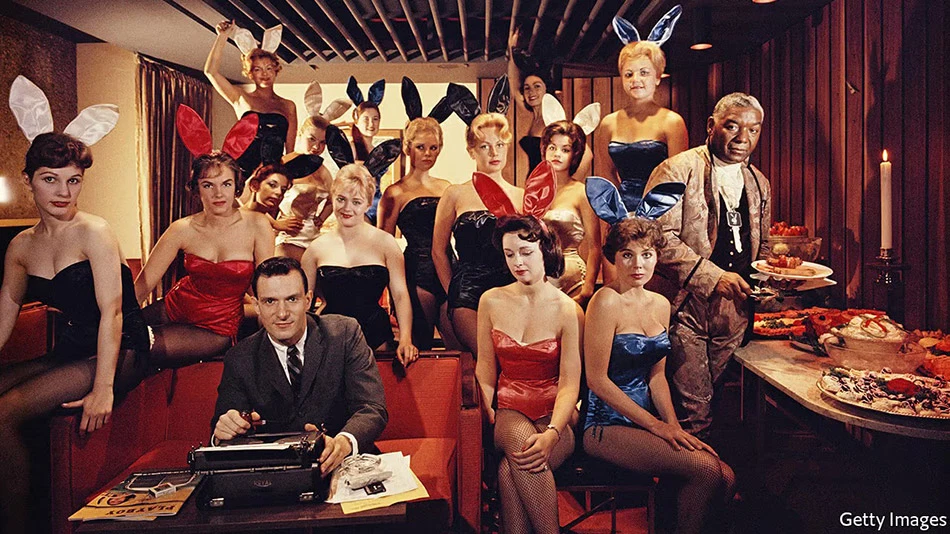The Hugh Hefner Revolution

When Hugh Hefner launched Playboy in 1953, he wasn't just creating a magazine; he was starting a cultural revolution. And what a revolution, my friends! It was as if someone had dropped a libido bomb on the puritanical America of the 1950s.
Imagine the scene: a country where showing one's ankle was considered daring, and suddenly a magazine appeared with Marilyn Monroe naked as she was born. It was as if someone had shouted "Fire!" in a packed theater, only instead of running for the exit, everyone ran to the newsstands.
But it was not easy. One of the biggest problems came from the U.S. Postal Service, which decided that Playboy was "too obscene" to be mailed. Just imagine: a magazine considered more dangerous than a letter bomb! Hefner had to go to court to fight for the right to show his belly buttons and other more interesting parts.
And it didn't stop there. The magazine was banned in several states, considered a threat to morality and good customs, and faced heavy criticism, especially from the feminist movement. But Hefner knew how to navigate these turbulent waters.
But Playboy wasn't just about nudity. It was about lifestyle. Hefner sold a dream: that of the sophisticated bachelor. Fine cigars, silk robes, parties at the mansion - it was the complete package of the alpha male of the 1950s.
Hugh Hefner revolutionized American television when he brought black artists to his show "Playboy's Penthouse" in 1959. At a time of deep racial segregation, this bold decision generated enormous repercussions. Hefner challenged prevailing social norms by presenting black talent on an equal footing with white artists, provoking intense reactions from conservative audiences, but also paving the way for greater racial inclusion in the media.
And we cannot forget Hugh Hefner's impact on sexual liberation. Before him, sex was something that happened in the dark, under the covers, with your eyes closed. After him, let's just say things got a lot more interesting.
Hefner changed the way we view sex, nudity and freedom of expression. She challenged social norms, broke taboos and, yes, showed a lot of boobs in the process. But more than that, he made us question our attitudes towards the body, pleasure and individual freedom.
So, the next time someone gives you the wrong look for being on Bella Club, remind them: you're not just looking at pictures of beautiful women. You're participating in a tradition of challenging the status quo, of questioning outdated social norms. You, my dear reader, are a cultural revolutionary!
And with that, I say goodbye. Remember: life is too short to worry about what other people think.
Until next time
Imagine the scene: a country where showing one's ankle was considered daring, and suddenly a magazine appeared with Marilyn Monroe naked as she was born. It was as if someone had shouted "Fire!" in a packed theater, only instead of running for the exit, everyone ran to the newsstands.
But it was not easy. One of the biggest problems came from the U.S. Postal Service, which decided that Playboy was "too obscene" to be mailed. Just imagine: a magazine considered more dangerous than a letter bomb! Hefner had to go to court to fight for the right to show his belly buttons and other more interesting parts.
And it didn't stop there. The magazine was banned in several states, considered a threat to morality and good customs, and faced heavy criticism, especially from the feminist movement. But Hefner knew how to navigate these turbulent waters.
But Playboy wasn't just about nudity. It was about lifestyle. Hefner sold a dream: that of the sophisticated bachelor. Fine cigars, silk robes, parties at the mansion - it was the complete package of the alpha male of the 1950s.
Hugh Hefner revolutionized American television when he brought black artists to his show "Playboy's Penthouse" in 1959. At a time of deep racial segregation, this bold decision generated enormous repercussions. Hefner challenged prevailing social norms by presenting black talent on an equal footing with white artists, provoking intense reactions from conservative audiences, but also paving the way for greater racial inclusion in the media.
And we cannot forget Hugh Hefner's impact on sexual liberation. Before him, sex was something that happened in the dark, under the covers, with your eyes closed. After him, let's just say things got a lot more interesting.
Hefner changed the way we view sex, nudity and freedom of expression. She challenged social norms, broke taboos and, yes, showed a lot of boobs in the process. But more than that, he made us question our attitudes towards the body, pleasure and individual freedom.
So, the next time someone gives you the wrong look for being on Bella Club, remind them: you're not just looking at pictures of beautiful women. You're participating in a tradition of challenging the status quo, of questioning outdated social norms. You, my dear reader, are a cultural revolutionary!
And with that, I say goodbye. Remember: life is too short to worry about what other people think.
Until next time
Author : Alexandre Peccin
Posted in: 12/10/2024
Last modified: 12/09/2025
0 comments